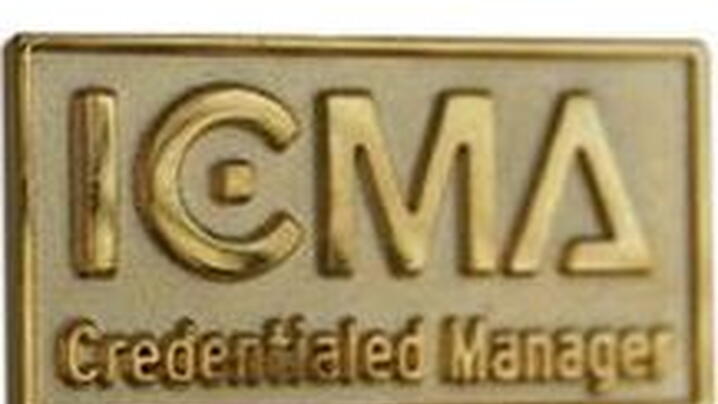
by Michael Milone, ICMA-CM, town manager (retired), Cheshire, Connecticut. with Arnett Talbot, assistant town manager-PIO, Cheshire.
Here is an overview of my experience participating in the ICMA Voluntary Credentialing Program, its rewarding impact on my career and life, and the multitude of benefits if provides.
The ICMA Code of Ethics advocates that we perform our duties and responsibilities at the highest standards of professional excellence, and commits us to lifelong learning and professional development. But we don’t all pursue this in a similar manner, nor do we all derive the same value, benefits, and gratification from our efforts. The credentialing program creates consistency in our efforts and provides the tools and guidelines to maximize the benefits of our applied learning, without disrupting our often chaotic daily work responsibilities.
When I began this program in my third year as town manager, I quickly discovered that my lifelong learning efforts had been fragmented and disjointed, lacking a defined purpose or structure. My shortcomings and weaknesses were not being addressed since they had not been clearly identified or I avoided acknowledging them. And the absence of deadlines led to uncompleted tasks. So, while I had committed to about 50 hours of annual learning, it was not productive or efficient, and fostered a false sense of learning.
Management Assessment: Relevance, Structured, Purposeful Learning
The most immediate and lasting benefit I derived from the ICMA Voluntary Credentialing Program was from the initial management assessment. Developed by ICMA and Georgia State University (GSU) and administered by GSU, this was a comprehensive assessment of knowledge. The report identified my strengths and developmental needs and forced me to confront issues that were outside of my comfort zone or not of interest to me, but integral to creating a relevant and realistic professional development plan. It was invaluable as a learning tool and guide and broadened my knowledge bandwidth.
This assessment and the credentialing program recommendations provided me with the ongoing resources for a structured, purposeful, and practical professional development plan across the18 core content practice areas for effective local government management. Every five years, this initial assessment was augmented with a 360° evaluation by a cross-section of almost 25 raters consisting of town elected and appointed officials, town senior and junior staff, and local residents. This external assessment of practical skills was a milestone evaluation and enabled me to reassess my progress.
Annual Professional Development Plan: Practical, Flexible, and Relevant
The program allows great flexibility in the design of one’s annual plan. In my case, I developed my plan around four specific areas:
- My assessment’s identified developmental needs.
- My annual goals and objectives established in collaboration with the town council, which allowed me to pursue learning experiences that would complement and support the priorities and needs of our organization as determined by our legislative body.
- My own areas of interest, such as wellness and organizational enrichment, mindful leadership, and work/life balance.
- Addressing evolving issues of importance.
Since there was broad opportunity and flexibility in my learning plan design, it constantly stimulated my learning interests and consistently reinvigorated my passion and enthusiasm for my profession and became an extension of my job. Additionally, since it was an annual exercise, it renewed and sustained disciplined commitment to lifelong learning.
Organization-wide Learning and Enrichment Opportunity
The spillover benefits to my staff were extensive. In many cases, my learning became their learning as my annual professional development program facilitated the development of staff workshops, book discussions, focus groups on topical areas, and the availability of shared reference materials.
Knowledge Retention
The program requires that the participant “reflect” annually upon their development activities and document their learning for peer review. This was invaluable; revisiting and describing my learning experiences enhanced retention and strengthened the application of my expanding knowledge base.
Additionally, the collection and variety of resource material that I accumulated each year became a frequent reference for me and my staff, and at times elected officials. Books, conferences, workshops, webinars, or classes I taught were all documented, codified in my annual report to ICMA, and available for future reference.
Credentialed Manager Designation
Last but not least of the benefits of pursuing this professional development program is the imprimatur of the ICMA Credentialed Manager designation. This title demonstrates a strong work ethic, signifies dedication and commitment to professional local government and the community one serves, and quantifies the unique expertise offered by the participant.
My recommendation is that if you are an ICMA Credentialed Manager, maximize the benefits of the program, and if you are considering pursuing this designation, go for it!
Eligibility Requirements for the ICMA Voluntary Credentialing Program
New, Reduced Membership Dues
A new, reduced dues rate is available for CAOs/ACAOs, along with additional discounts for those in smaller communities, has been implemented. Learn more and be sure to join or renew today!
